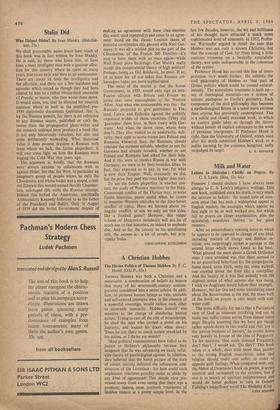Milk and Water
PERHAPS I should declare I have always been allergic to C. S. Lewis's religious writings. This new book, published since his death, is very much the mixture as before: the sound note of com- mon sense that has such a widespread appeal to English readers, the analogies which appear on first sight to be so well worked out, but which fall to pieces on closer examination, plus the spinsterish anecdotes thrown in for good measure.
After an extraordinary opening letter in which he appears to be opposed to change of any kind, including matters of liturgy and Biblical re- vision, one surprisingly strikes a passage in the second letter• which shows Lewis at his best: `What pleased me most about a Greek. Orthodox mass I once attended was that there seemed to be no prescribed behaviour for the congregation. Some stood, some knelt, some sat, some walked; one crawled about the floor like a caterpillar. And the beauty of it was that nobody took the slightest notice of what anyone else was doing. I wish, we Anglicans would follow their example.' However, but for this and some stimulating ideas about the Resurrection at the end, the main bulk of the book on prayer is very much milk-and- water stuff.
The main difficulty for me is that a Puritanical view of God as someone terrifying and out to make one suffer comes across from almost every page. Despite asserting that we have got things rather upside-down in this world and that 'joy is the serious business of heaven,' he comes down very heavily in favour of the idea of Purgatory. To his question 'Our souls demand Purgatory, don't they?,' I would ask, 'Do they?' This book taken as a whole, does little more than pander to the strong English masochistic sense that religion should make • one suffer, in order to appease guilt feelings. When compared with, say, the Abbot of Downside's book on prayer, it seems amateur and uninspired in the extreme, but if one is in Search of spiritual enlightenment one would do better perhaps to turn to Gabriel Fielding's magnillcent novel The Birthday King•
JOHN HORDER


































 Previous page
Previous page